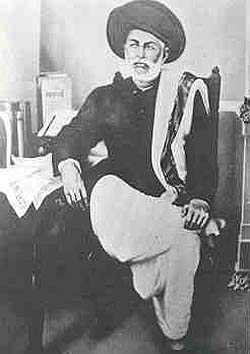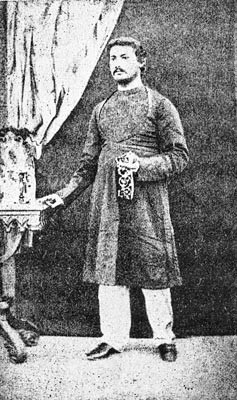
Bardai Brahmins are a community living in Western India. [1] They traditionally have a variety of professions, including priesthood, merchants, revenue collectors, teachers, and village policemen. [2]

Bardai Brahmins are a community living in Western India. [1] They traditionally have a variety of professions, including priesthood, merchants, revenue collectors, teachers, and village policemen. [2]

Raja Ram Mohan Roy was an Indian reformer who was one of the founders of the Brahmo Sabha in 1828, the precursor of the Brahmo Samaj, a social-religious reform movement in the Indian subcontinent. He was given the title of Raja by Akbar II, the Mughal emperor. His influence was apparent in the fields of politics, public administration, education and religion. He was known for his efforts to abolish the practices of sati and child marriage. Roy is considered to be the "Father of Indian Renaissance" by many historians.
Brahmin is a varna as well as a caste within the Hindu society. In Vedic- and post-Vedic Indian subcontinent, Brahmins were designated as the priestly class as they served as priests and spiritual teachers. The other three varnas are the Kshatriya, Vaishya, and Shudra.

Jyotirao Govindrao Phule was an Indian social activist, thinker, anti-caste social reformer and writer from Maharashtra. His work extended to many fields, including eradication of untouchability and the caste system and for his efforts in educating women and oppressed caste people. He and his wife, Savitribai Phule, were pioneers of women's education in India. Phule started his first school for girls in 1848 in Pune at Tatyasaheb Bhide's residence or Bhidewada. He, along with his followers, formed the Satyashodhak Samaj to attain equal rights for people from lower castes. People from all religions and castes could become a part of this association which worked for the upliftment of the oppressed classes. Phule is regarded as an important figure in the social reform movement in Maharashtra.The honorific Mahātmā, was first applied to him in 1888 at a special program honoring him in Mumbai..
Brahmo Samaj is the societal component of Brahmoism, which began as a monotheistic reformist movement that appeared during the Bengal Renaissance.

Shahu of the Bhonsle dynasty of Marathas was a Raja and the first Maharaja (1900–1922) of the Indian princely state of Kolhapur. Rajarshi Shahu was considered a true democrat and social reformer. Shahu Maharaj was an able ruler who was associated with many progressive policies during his rule. From his coronation in 1894 till his demise in 1922, he worked for the cause of the lower caste subjects in his state. Primary education to all regardless of caste and creed was one of his most significant priorities.

Tāmrakār is a caste of coppersmiths and other metal casters found in Nepal and India. In Nepal, the Tamrakars are found among the Newar community of the Kathmandu Valley.

Sir Narayan Ganesh Chandavarkar was an early Indian National Congress politician and Hindu reformer. He was regarded by some as the "leading Hindu reformer of western India".

Satyashodhak Samaj was a social reform society founded by Jyotiba Phule in Pune, Maharashtra, on 24 September 1873. It espoused a mission of education and increased social rights and political access for underprivileged groups, focused especially on women, peasants, and Dalits, in Maharashtra. Jyotirao's wife Savitribai was the head of women's section of the society. The Samaj disbanded during the 1930s as leaders left to join the Indian National Congress party.
Adi Dharm refers to the religion of Adi Brahmo Samaj the first development of Brahmoism and includes those Sadharan Brahmo Samajists who were reintegrated into Brahmoism after the second schism of 1878 at the instance of Hemendranath Tagore. This was the first organised casteless movement in British India and reverberated from its heart of Bengal to Assam, Bombay State, Punjab and Madras, Hyderabad, and Bangalore.

Hemendranath Tagore (1844–1884), Debendranath Tagore's third son, is notable for being the first Brahmo as the first child born in 1844 to any of the original 21 Brahmos who swore the First Brahmo Covenant on 21 December 1843 at Calcutta. An intensely private person, he was also well known as the strict disciplinarian entrusted with the responsibility of looking after the education of his younger brothers in addition to being administrator for his large family estates.
The Brahmo Conference Organisation (Sammilan) was founded on 27 January 1881 at Mymensingh Bangladesh to maintain communication between Adi Dharm and Sadharan Brahmo Samaj after the 2nd schism of Brahmoism in 1878. The stated objectives for founding the organisation included
The Tattwabodhinī Sabhā was a group founded in Calcutta on 6 October 1839 as a splinter group of the Brahmo Samaj, reformers of Hinduism and Indian Society. The founding member was Debendranath Tagore, previously of the Brahmo Samaj, eldest son of influential entrepreneur Dwarkanath Tagore, and eventually father to renowned polymath Rabindranath Tagore. In 1859, the Tattwabodhinī Sabhā were dissolved back into the Brāhmo Samāj by Debendranath Tagore.

Keshavrao Marutrao Jedhe (Deshmukh) (25 April 1896 – 12 November 1959) was an Indian independence activist and politician from Pune. He served as a leading figure in the Indian National Congress, and in the Samyukta Maharashtra movement during independence. The famous Swargate chowk in Pune is named after him.
Gomantak Maratha Samaj is a Hindu community found in the Indian state of Goa. They are known as Nutan Maratha Samaj in the Sindhudurg district of Maharashtra and Naik Maratha Samaj in Maharashtra, Uttara Kannada district of Karnataka, also Telangana respectively.
The Muslim Raibhat or Raibhaat are a Muslim community found in North India they also known as bhaat and Sheikh in Islam. They are converts to Islam from the Rai Bhatt or Raibhaat community. The Muslim Rai Bhatt or Raibhaat are the heredity bards and genealogists of many communities in India. A small number are also found in the city of Karachi in Pakistan, where they now form a component of the Muhajir community. Muslim Rai Bhatt or Raibhaat is not only in Uttar Pradesh but is registered in the Indian Gazette all over India but according to the state, all are placed in different categories.
The Kirar is a Hindu agricultural caste whose traditional occupation is cultivation. They originated in Kiserkot of Jaisalmer and migrated to different parts of India. Singh noted that, they were a similar group like Kol and Bhil, and lived a hunter-gatherer lifestyle. Now they have settled down in different areas where agriculture is their main occupation. Kirar has three subgroups: Karod, Dhakad and Dharod Kirar. In local caste hierarchy they come next to Brahmin, Jain and Rajput. They accept food from the upper castes however the upper castes do not accept food from Kirar. The Kirar are educationally backward. In 1966, the All India Kirar Samaj Sangh was established. The organization promotes community members' financial well-being and benefits. They have submitted a memorandum requesting that they be added to the list of Scheduled Castes.

Twashta Kasar is a Hindu artisan caste of coppersmiths, predominantly residing in the Indian state of Maharashtra. In Goa, they call themselves Twashta Kasar Brahmin. According to Herbert Hope Risley, they are a branch of the Suvarna Banik, who became degraded because they took to working in metal.
Jam kalyanpur is a village and administrative division in Dwarka district, Gujarat, India. It was founded in the 18th century by Ahirs.
Harish Dwivedi is an Indian politician and a member of 16th and 17th Lok Sabha from the Basti as a member of Bharatiya Janata Party. He is currently the National Secretary of Bharatiya Janta Party.
Sanātanī (सनातनी) is a term used to describe Hindu duties that incorporate teachings from The Vedas, The Upanishads, and other Hindu religious texts and scriptures such as The Ramayana and The Bhagavad Gita, which itself is often described as a concise guide to Hindu philosophy and a practical, self-contained guide to life. The word sanatani is coined from Sanātana Dharma which refers to the idea that its origins lie beyond human history, as revealed in the Hindu texts.